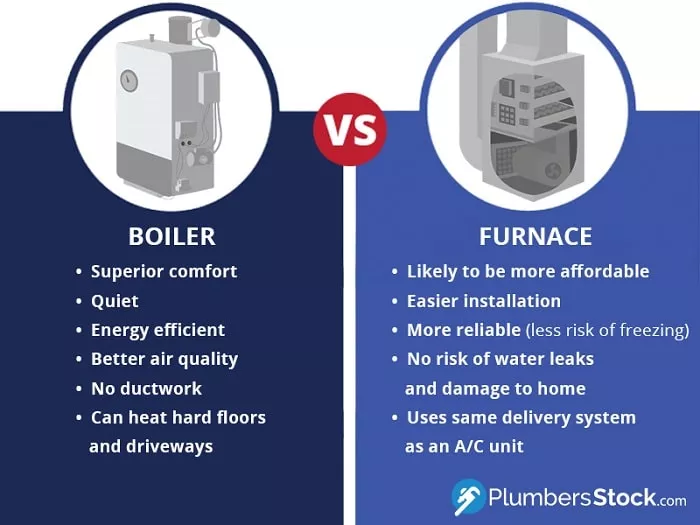The furnace has become a staple of modern living in America, but other home heating systems exist. You may find older homes that still use boilers, and they still make sense for some homeowners and landlords. If you’re not sure what the best HVAC solution is for you, then you’ve come to the right place. Learn all about choosing a boiler vs. a furnace with this helpful article.
What Is the Difference Between a Boiler and a Furnace?

Consider the following pros and cons:
Furnaces
- A furnace supplies heat to a home or building via a forced-air system. In other words, it circulates warm air around the home with a heating mechanism, a blower, and a duct and vent system.
- Typically run on natural gas or electricity, you will find some furnaces fueled by propane or oil.
- Proper guidelines suggest a minimum of monthly maintenance (changing the air filter).
- A furnace can cost anywhere from $2,000 to $10,000 depending on the fuel type, efficiency, BTU output, etc.
- If your house is already built for forced air, a furnace installation is relatively easy.
- You don’t have to worry about plumbing leaks and the home damage that comes with them.
A furnace will be the right choice for most homeowners because you likely already need/have a forced-air system for cooling the home.
Boilers
- A boiler supplies heat to a home or building via radiant heating. That means that hot water/steam is distributed around the house through plumbing pipe. It’s very similar to how radiators work, except those operate locally, and a boiler is a central system.
- Boilers run on natural gas, electricity, oil, and in some cases, even wood pellets.
- Proper guidelines suggest annual maintenance in the form of a system checkup by a professional.
- A boiler for your home is probably running between $3,500 and $8,000.
- Even if your home is built for radiant heating, a boiler is still relatively difficult to install.
- Because it uses water, extreme temperatures below the freezing point threaten the boiler’s operation.
- Boilers are quieter and more energy-efficient.
- Radiant heat is more comfortable than forced air, and it’s better for people with allergies.
- Certain setups will allow your boil to do double-duty as a water heater.
- You can use your boiler to heat your kitchen and bathroom floors, as well as the driveway (no more shoveling snow).
Unless your home is already plumbed for radiant heating, a boiler probably isn’t the best choice for you. However, if you are starting from scratch and building a new home in an area where you don’t even have or need AC, then a boiler is likely the right option for you.
Boilers, Furnaces, and More
With your new knowledge of how boilers compare vs. furnaces, it's time to shop around. We have great deals on heating solutions, including boilers. PlumbersStock offers HVAC parts, like gas conversion kits, blowers, and more. Did you know that you can find member pricing here on certain items (typically name brand, MAP priced items) if you log in? For industry professionals buying in bulk, please consider contacting us directly for extra special pricing and extra savings.
Related resources:
What Is a Furnace?
Furnace vs. Heat Pump
What Size Furnace Is Recommended?
What Size Boiler Do I Need?
1-Stage vs. 2-Stage Furnaces
Upflow vs. Downflow Furnace



